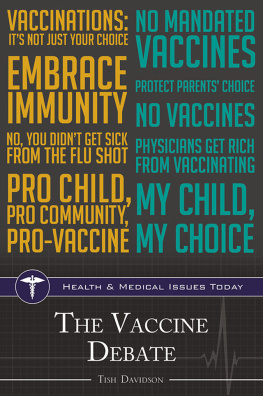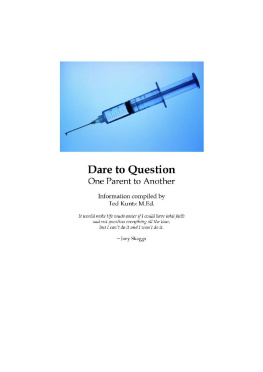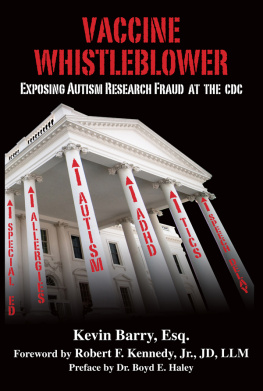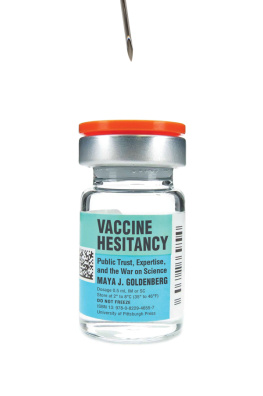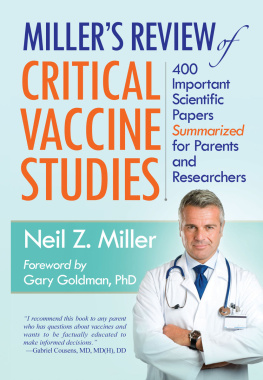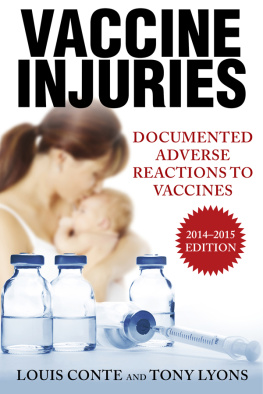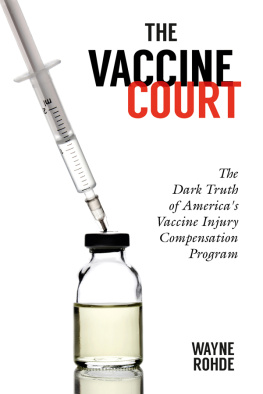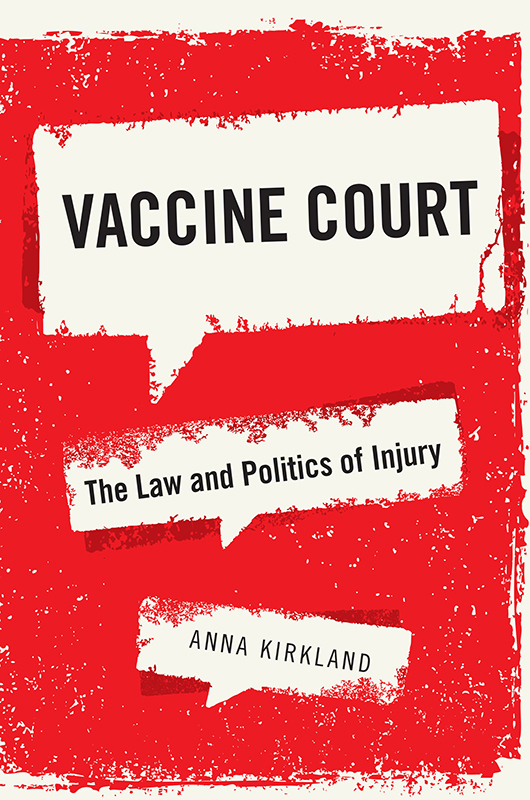
Vaccine Court
Vaccine Court
The Law and Politics of Injury
Anna Kirkland

NEW YORK UNIVERSITY PRESS
New York
NEW YORK UNIVERSITY PRESS
New York
www.nyupress.org
2016 by New York University
All rights reserved
References to Internet websites (URLs) were accurate at the time of writing. Neither the author nor New York University Press is responsible for URLs that may have expired or changed since the manuscript was prepared.
Library of Congress Cataloging-in-Publication Data
Names: Kirkland, Anna (Anna Rutherford), author.
Title: Vaccine court : the law and politics of injury / Anna Kirkland.
Description: New York : New York University Press, [2016] | Also available as an ebook. | Includes bibliographical references and index.
Identifiers: LCCN 2016023901| ISBN 978-1-4798-7693-8 (cl ; alk. paper) | ISBN 1-4798-7693-3 (cl ; alk. paper)
Subjects: LCSH: VaccinationLaw and legislationUnited States. | United States. Court of Federal Claims. Office of Special Masters. | VaccinationPolitical aspectsUnited States. | VaccinationComplicationsUnited States. | Products liabilityVaccinesUnited States.
Classification: LCC KF3808 .K57 2016 | DDC 344.7304/3dc23
LC record available at https://lccn.loc.gov/2016023901
New York University Press books are printed on acid-free paper, and their binding materials are chosen for strength and durability. We strive to use environmentally responsible suppliers and materials to the greatest extent possible in publishing our books.
Manufactured in the United States of America
10 9 8 7 6 5 4 3 2 1
Also available as an ebook
To the men and women of the vaccine court
and all who work for vaccine safety
Contents
Acknowledgments
Introduction: Our Immunization Social Order
1. How Are Vaccines Political?
2. The Solution of the Vaccine Court
3. Health and Rights in the Vaccine-Critical Movement
4. Knowing Vaccine Injury through Law
5. What Counts as Evidence?
6. The Autism Showdown
Conclusion: The Epistemic Politics of the Vaccine Court
Notes
Index
About the Author
Acknowledgments
The chance to research interesting questions and then to write about them as part of an intellectual community is the great privilege of being a college professor. I realized when I could not stop reading and following the rulings of the vaccine court that it would just have to be the subject of my next book. This book would not have been possible without people being willing to talk to me about the vaccine court and their experiences within it, and I am deeply indebted to all of them. I did much of the research for this project as a fellow at the Law and Public Affairs Program at Princeton University in 20102011, where I enjoyed proximity to Washington, D.C., as well as the generous resources and stimulating conversations with my colleagues there, especially Kim Lane Scheppele, Paul Frymer, Leslie Gerwin, Elizabeth Mertz, Tanya Hernandez, Amy Lerman, Gordon Silverstein, Hendrik Hartog, Steven Wilf, and Keith Wailoo. The scholarly environment at the University of Michigan has nurtured me for my entire career. I am blessed with generous colleagues in the Science, Technology, and Society (STS) program who read and commented on sections of the book, especially Shobita Parthasarathy, Joel Howell, Gabrielle Hecht, Paul Edwards, Alexandra Stern, John Carson, Marty Pernick, Elizabeth Roberts, Joy Rohde, and Perrin Selcer. Sarah Fenstermaker and my colleagues at the Institute for Research on Women and Gender were especially caring in the final weeks of manuscript preparation. I also wish to thank Elizabeth Anderson, Roger Bernier, Carol Boyd, Art Caplan, Elizabeth Cole, Kevin Conway, Charles Epp, Geoffrey Evans, Eric Feldman, Patricia Segal Freeman, Sander Greenland, Colleen Grogan, Peter Jacobsen, Carla Keirns, Anders Kelto, Sandra Levitsky, Aaron Ley, Michael Lynch, Jonathan Metzl, Clark Miller, Jennifer Mnookin, Brendan Nyhan, Paul Offit, Lisa Prosser, Jennifer Reich, Dorit Reiss, Dorothy Roberts, Abigail Saguy, Dan Salmon, Jason Schwartz, Jeffrey Segal, Chloe Silverman, Sergio Sismundo, Emily Stopa, Beth Tarini, Curtis Webb, Elizabeth Wingrove, and insightful anonymous reviewers for their help in thinking through the ideas in this book and for presenting me with new ones. Tom Burke has always been encouraging when it seemed like we were the only two people in all of political science who were interested in the vaccine court.
I presented papers that would become parts of this book and benefited from energetic audience participation at Northwestern Universitys Science in Human Culture Klopsteg lecture series, the American Bar Foundation, Vanderbilt Universitys Center for Medicine, Health, and Society, the University of Pennsylvania Health Law Students Association, the UCLA School of Law faculty lecture series, the University of Michigan Center for Ethics in Public Life, and the Child Health and Evaluation Research Unit at the University of Michigan School of Medicine. Anna Frick, Denise Lillvis, Lotus Seeley, and Courtney Shier (from Michigans Undergraduate Research Opportunity Program) provided timely and helpful research assistance; Kathy Wood transcribed my interviews. I received research funding support from Princeton University, from the College of Literature, Science, and the Arts at the University of Michigan (Faculty Research Grant and Associate Professors Fund), from the Womens Studies Department at Michigan, and from the Institute for Research on Women and Gender at Michigan (IRB #HUM00031641). I received no funding from any private corporation or from any government grant, and I have no conflicts of interest. My discussions of vaccine policy trends in the states are based on research first done with Denise Lillvis and adapted here from our article Power and Persuasion in the Vaccine Debates: An Analysis of Political Efforts and Outcomes in the States, 19982012, with Denise Lillvis (first author) and Anna Frick, Milbank Quarterly 92, no. 3 (September 2014): 475508. A version of Chapter 6 was published as Credibility Battles in the Autism Litigation, Social Studies of Science 42, no. 2 (April 2012): 23761. Chapter 3 on vaccine critics shares some material from The Legitimacy of Vaccine Critics: Whats Left after Autism?, Journal of Health Policy, Politics and Law 37, no. 1 (February 2012): 6997, copyrighted at Duke University Press, and I first worked on the political account of vaccines that now constitutes Chapter 1 while composing my entry on childhood vaccines for Brent Steels Science and Politics: An A to Z Guide to Issues and Controversies (CQ Press/Sage, 2014). I thank all these publishers for permission to reuse these prior publications.
My family and friends have been a steadfast source of joy and support. I am very grateful to my network of caregivers whose labor created the time for me to write this book, especially Hannah Jones, Noreen Smith, Sarah Wizinsky, and the staff and teachers at the Ann Arbor Jewish Community Center.
Introduction
Our Immunization Social Order
Vaccine Injury and the Immunization Social Order
When parents hesitate or refuse to vaccinate their children, it is often because they have doubts about vaccine safety.
Vaccine injuries are a complex and fascinating problem. They expose tensions between parents and professional experts, between certainty and doubt, and between different ways of knowing and being sure. Vaccine injuries display the inevitability of the meeting between science, politics, and the law, giving us a case to explore how well our democracy manages this tense and productive collaboration. Experts and activists have widely divergent ideas about what vaccine injuries are and how to recognize them, and recent decades have seen a strong social movement mobilized around injury claims. American vaccines are embedded
Next page

